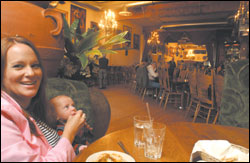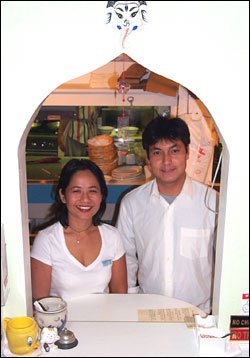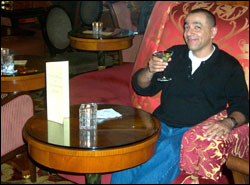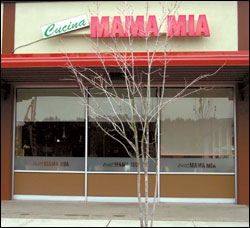Foodies will do anything to relive a great meal. During the 1889 Universal Exposition celebrating the French Revolution’s centennial, Parisians re-created old restaurants where they were served by waitstaff in historic prerevolutionary costumes. And Marcel Proust said he could summon the past by dipping a madeleine in lime-blossom tea and stirring his remembrances of things past.
The Iranian Revolution celebrated its silver jubilee Feb. 11, so we thought it proper to dine at Kolbeh and make some memories of our own. Huddled in the shadow of Safeco Field, Kolbeh is known among area Persians for imaginative cooking and ambience that conjure up visions of prerevolutionary Iran.
Before 1979, the Iranian capital, Tehran, was dotted with ornate bars and nightclubs, most of which were shut down by the revolution. The revolutionary guard didn’t account for the million-plus Iranians who would flee the revolution that decade, bearing the burden of exile and the memory of a great cuisine.
Kolbeh (in Farsi, the word means “little home”) started as a modest hangout for Seattle’s Iranian exiles. In the 11 years since, it has grown into a veritable amusement park of Persian delights: kebabs and stews, belly dancers and live music. The restaurant went through some growing pains a couple of years ago and was temporarily closed, but on our recent visit we found Kolbeh charming and as busy as ever. Thanks to a full renovation and expansion in 2002, its huge dining room is even larger. Wrought iron chandeliers hang from the ceiling, and Persian rugs and prints adorn the high walls.
Our fete began with an appetizer of cheese and veggies—thick pieces of feta, fresh basil, sliced onions, and cucumber. At $4.50, it was moderately priced and a great palate cleanser. We didn’t have to snap our fingers and yell, garçon!—the customary way of summoning a waiter before the revolution—for the main course. Our server delivered the food quickly and all we had to say was merci beaucoup, the standard Francophone way of saying thank-you before 1979 (Iranians now prefer the Farsi tashakur, or “gratitude”). The stewed eggplant ($9.99) with tomatoes, onions, and spices was light, with a lemony kick. We enjoyed it the traditional way, with long-grain rice garnished with fragrant sumac leaves. To further awaken the vegetarian within, we indulged the senses with a traditional kidney bean stew ($8.99) with fresh chives and parsley. It was seasoned well with fenugreek, a sharp, fragrant spice used in authentic Persian cooking. Both stews were cooked with fresh ingredients and served hot off the stove.
The highlight of our meal was the Cornish game hen ($17.99) baked on the bone in its own juice and served with a slow-cooked pilaf delicately flavored with lima beans and dill. The chicken was moist and flawlessly tender. Each forkful dissolved on the palate.
Like all Persian restaurants, Kolbeh also offers an array of chicken, lamb, and beef kebabs, skewered and grilled over an open flame. For our money, we say kebab fans are best off taking advantage of Kolbeh’s weekday prix-fixe lunch menu: one skewer of chicken or beef kebab served on a bed of fragrant long-grain rice for $4.99. It’s the best deal since Tehran real estate crashed in 1979.
For the full Kolbeh experience, call ahead and dine on a Friday or Saturday night, as we did, then stay for the belly dancing, which takes place between 10 p.m. and 3 a.m. Cairo-style belly dance cabarets were popular in prerevolution Iran, and, for many in the crowd, the performances bring back memories.
Proust summoned the past simply, with his madeleine and tea. Kolbeh does so with great food and perfect ambience—all the devices an Iranian needs to embrace the drama of exile. And all the ingredients a non-Iranian requires to taste a great cuisine decontextualized by revolution.








